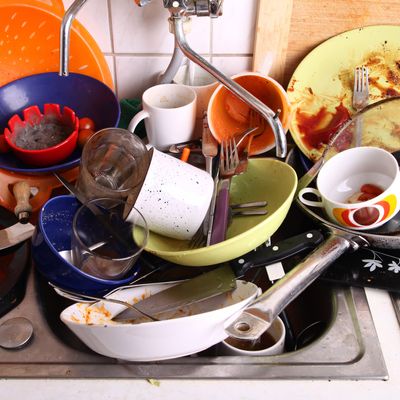
The daily minutiae of marriage are rich fodder for conversations about gender. Case in point: Stephen Marche’s story on men and housework in this weekend’s New York Times. In it, the Esquire contributing editor makes the “case for filth,” arguing that women should do less housework because standards of cleanliness are fungible and subjective, as Renaissance Europeans would have been considered filthy by the Ancient Romans; that even basic housework is “ethereal” because his wife hates removing cutlery from the dishwasher; and that “domesticity is the macho nonsense of women.” Marche’s conclusion is that everyone should stop doing housework: Stop making the bed, fixing the broken gate, or clearing the stairs of clutter. This is preposterous. And what’s more, Marche’s blind spots undercut his argument for “egalitarian squalor.”
Let’s address his assertions one by one. The filth of Renaissance Europe — “Filth running in open ditches in the streets, fly-blown meat and stinking fish, contaminated and adulterated ale, polluted well water, unspeakable privies, epidemic disease” — directly led 200 million people to die from the Bubonic Plague. That is objectively, not subjectively, filthy.
Housework — again, we’re talking clean floors, dishes, removal of rotting food, and basic picking up — is not ethereal. It is incredibly straightforward and physical. Certainly, it can speak to underlying marital dynamics, but it doesn’t necessarily have to be an expression of love and intimacy and understanding every goddamn time you clean the toilet.
Finally, and where Marche is most glaringly wrong, is saying that domesticity is “the macho nonsense of women.” Yes, there are Pinterest divas who spend a lot of time making candles and knitting, as Marche dismissively writes. (Let’s not even go into the fact that he is reflexively dismissing these activities because he associates them with women.) But that is not what we are talking about: No one feels men ought to spend more time making mason jar Christmas ornaments. We are talking about our husbands vacuuming once a month. That is not the “garbage” of gender stereotypes. This is bottom-basement courtesy when you are in a shared living arrangement, regardless of whether your roommates are men, women, children, or animals.
As I wrote in the New Republic in March, American men have made great strides in doing their fair share of other traditionally female tasks like child-care and cooking, but they’re still punking out on housework. I briefly considered the solution of women doing less housework to even the score — but in general, why should women lower their standards to accommodate male partners who happen to be slackers? And furthermore, once you have kids, you can’t let them live in filth. Toddlers will eat dust bunnies, and parents will trip on the miles of plastic crap lying around. We’re not talking Martha Stewart perfection; we’re talking a baseline of cleanliness.
Which brings me to a final gripe that — while personal — is telling, I think. In his Times op-ed, Marche links to an essay that Daily Intel’s Jonathan Chait wrote in response to my original TNR piece, but he does not link to that piece, despite the fact that Chait starts his essay this way: “Jessica Grose has an interesting piece for The New Republic observing — and also decrying…” This might seem like writerly vanity on my part — but my Slate colleague Amanda Marcotte agrees that Marche’s omission speaks volumes, because I focus “on solutions that might result in men doing more work with less prompting,” rather than just letting dudes off the hook. In a way, this is just a classic example of chauvinism: belittling and ignoring female contributions, whether they are intellectual or domestic.




